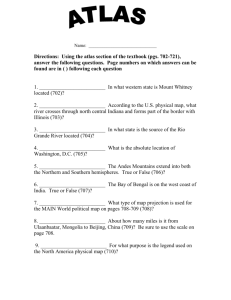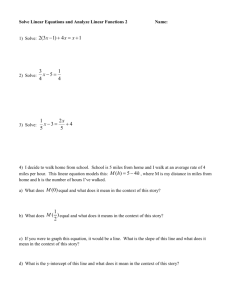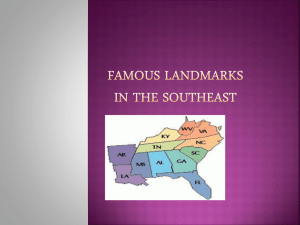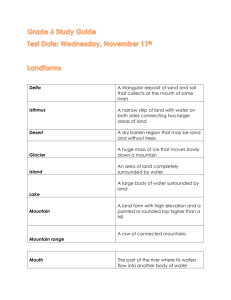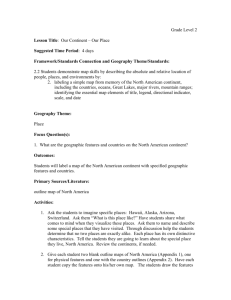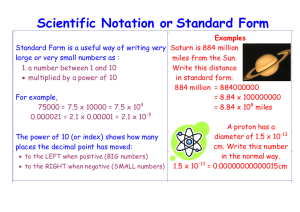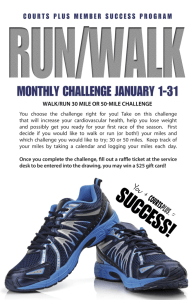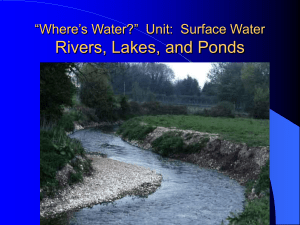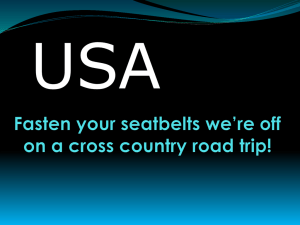Chapter 9 and 10
advertisement
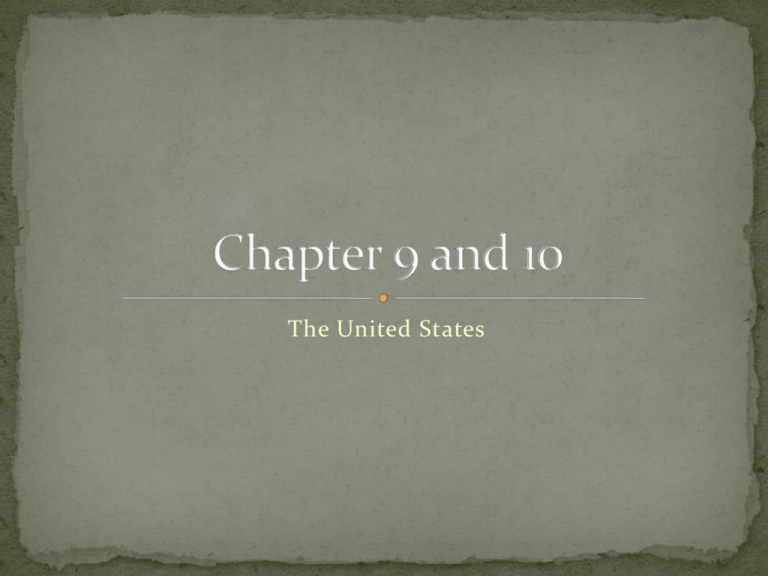
The United States 3rd in population (behind China and India) 3rd in size (behind Russia and Canada) Most stable government in existence Long history of freedom Varieties of natural resources Can’t produce everything, must trade with other nations Landmass: stretches from Atlantic to Pacific, large peninsula of Alaska, Hawaiian islands, several territories in the Pacific and Caribbean Boundaries– two main borders: Canada, Mexico Immigration pg. 211 Map on pg. 213 Appalachian Mountains-from Canada to N. Alabama Smokies, Allegheny, Catskills, Blue Ridge Eastern Continental Divide Central Plains-fertile rolling hills, Great Lakes and Mississippi river supplies water for rich soil Great Plains- from Central Plains to Rocky Mountains, flat grasslands Rocky Mountains Western Continental Divide Pacific Mountain Range-several mountain ranges make up the system Sierra Nevada, Cascade (Mt. St. Helens), Coastal Ranges Can you name the top 5 largest states? Alaska- 594,004 sq. miles Texas- 266,807 sq. miles California-156,537 sq. miles Montana-145,603 sq. miles New Mexico-121,593 sq. miles Diverse is the best word to describe the American people Most of us are descendants of immigrants who brought their language, customs and culture to the US Core Values Freedom Equality Individualism Est. population of 296 million people 79% live in urban areas Life expectancy- 77 years Minority groups are growing and tend to clump together Estimates indicate that more than half of the nation’s population could be minorities by 2050 Federal Republic Power is shared between national government and the government of the 50 states Free Enterprise Capitalism Private individuals own industries More government control since Great Depression and WWII, still freest in the world New England Upper New England New Hampshire (Concord)-one of original 13 colonies, northern part known for Christmas tree farms Vermont (Montpelier)- only landlocked NE state, lowest population, famous for maple syrup Maine (Augusta)- largest NE state, famous for lobster, trees in this region provide most of the nations’ toothpicks Lower New England Massachusetts (Boston)- first NE colony to be established by Pilgrims in 1620 by the Mayflower Compact, major base for American Revolution, home to leading political families Rhode Island (Providence)-founded by Roger Williams, considered the birthplace of the Industrial Revolution in the New World Connecticut (Hartford)- first colony to write a constitution to describe its government, famous inventors (Colt and Whitney) Middle Atlantic New York (Albany)-most populous Mid Atlantic state, NYC is the largest city in the nation New Jersey (Trenton)- very fertile soil-Garden State Pennsylvania (Harrisburg)-planned out by Quaker founder William Penn, has landmarks like Independence Hall ,Liberty Bell, and Gettysburg battlefield Maryland (Annapolis)- shares the Delmarva peninsula with Delaware and Virginia, capital is home to US Naval Academy Delaware (Dover)- second smallest state Not part of any state District run by Congress Overlooks the Potomac river, city built on Capitol Hill Current location: compromise between NYC and Philadelphia •Symbol of freedom and opportunity in the United States •Gift from France to celebrate the United States’ first 100 years of independence •Tallest statue ever built, 111 feet tall, because of oxidation the copper has turned green. •Her nose alone is the size of a person “Give me your tired, your poor, your huddled masses yearning to breathe free…” The Upper South Virginia (Richmond)- first settlement in Jamestown, still producing many agricultural products West Virginia (Charleston)-split from rest of Va in 1861 during the Civil War, best known for production of bituminous coal North Carolina (Raleigh)-nation’s leading turkey, sweet potato and tobacco producer, Research Triangle in Raleigh-Durham is leading center for biotechnology and computers Kentucky (Frankfort)- mountains in the East, flat areas in the Bluegrass region and low plains in the West, first in livestock and horse exports Tennessee (Nashville)- diverse economy- agriculture and commerce, Music City USA Arkansas (Little Rock)- smaller pop. than any other southern state besides West Virginia, headquarters of Walmart The Lower South South Carolina (Columbia)- produces more peaches than GA, tourism is top money-maker Georgia (Atlanta) Atlanta lies in the Piedmont (foothills) and has the South’s highest skyscraper, headquarters for Coca-Cola Florida (Tallahassee)- only state with coasts on both the Atlantic and the Gulf of Mexico, oldest city St. Augustine, southernmost part of US = Key West Alabama (Montgomery)- more than half of the state is Gulf Coastal Plain, northern part has tail end of Appalachian mts. Cotton is still the chief crop Mississippi (Jackson)- Mississippi river dominates the area, cotton is profitable due to rich soil, historically the poorest state in the nation Louisiana (Baton Rouge)- located at the mouth of the Mississippi river, swampy areas called bayous, Hurricane Katrina in 2005 flooded 80% of New Orleans Texas (Austin)- largest of Southern states, first in nation in cattle and cotton production, 3 of 10 largest cities in the nation (Houston, Dallas, San Antonio), shares characteristics and culture of surrounding areas (Hispanic, Southwest, Midwest) Around the Great Lakes, transportation hub, Breadbasket of the Nation Ohio (Columbus)- Lake Erie and Lake Michigan border in the north, Akron is famous for tires Indiana (Indianapolis) several industrial areas: Fort Wayne, Evansville, Gary and Elkhart (leads the nation in making brass instruments), Indianapolis has the Indy 500 Illinois (Springfield)- Chicago is on Lake Michigan- largest city in the Midwest and the transportation capital of the nation Michigan (Lansing)- only state with a shoreline on 4 of the 5 Great Lakes, split in two by Lake Michigan- lower part has the greater population, Detroit= Motor City because the 3 big auto makers headquartered there (Ford, GMC, DaimlerChrysler) Wisconsin (Madison)- known as America’s Dairyland- ¼ of all cheese produced in USA, one dairy cow for every two people Minnesota (St. Paul)- “Land of Ten Thousand Lakes”-, half of the population lives in the twin cities of Minneapolis and St. Paul- divided by the Mississippi River, Minneapolis is home of the Mall of America Iowa (Des Moines)-the Drift Prairie produces 7% of nation’s food supply, has 4 hogs for every 1 person in the state Missouri (Jefferson City)- “Gateway to the West”, St. Louis developed at the convergence of Mississippi River and Missouri river, jumping off point for travelers heading out west, the Gateway Arch is the largest monument in the nation, Pony Express and Oregon Trail had their beginning post in Missouri North Dakota (Bismarck)- shares border with Saskatchewan, Canada, agriculture is still the state’s main industry and source of income, 3 Indian reservations in the west, Badlands National Park South Dakota (Pierre)- 9 Indian Reservations, Mount Rushmore, gold is the most important mineral Nebraska (Lincoln)- farms cover 95% of the land, only state to have a unicameral legislature, Omaha and Lincoln are major cities for insurance companies Kansas (Topeka)- leads the nation in sunflower seeds, manufacturing and service industries are larger than agriculture, Wichita has large aircraft industry producing mainly private planes Oklahoma (Oklahoma City)- Means “red man,” gets name from the 5 Civilized Tribes that were forced to relocate to Oklahoma in the 1800s, most important product: oil Continental West is a land of extremes- hottest, coldest, highest and lowest, riches beyond the early settlers wildest dreams Montana (Helena) “Big Sky Country”, leads the nation in production of talc, platinum and gem sapphires Wyoming (Cheyenne)- Yellowstone National Park (Old Faithful)- first such park in the nation, largest industry is mining Idaho (Boise)- Produces more potatoes than any other state, first white people to live in Idahomissionaries to the Nez Perce Indians Colorado (Denver)- almost half of the state is flat plains, largest cities are at the foot of the Rockies, very fertile area, tourism is a major part of the economy Utah (Salt Lake City)- Great Basin, headquarters of Mormonism, not great soil, main agricultural products are cattle and poultry Mormons-- New Mexico (Santa Fe)-very dry climate- not a major agricultural center, very rich in mineral resources, Carlsbad Caverns bring in money from tourists Arizona (Phoenix)- southern part is the Sonoran Desert- only place where saguaro cactus grows, sights for tourists: Petrified Forest, Painted Desert and the Grand Canyon, major retirement destination California (Sacramento)-3rd in size and 1st in population, Death Valley- lowest spot on the continent (282 ft. below sea level), Sierra Nevada mountain range includes Mt. Whitney the highest mountain outside Alaska, home of Silicon Valley- computer tech area, Hollywoodcenter of motion picture industry Nevada (Carson City)- driest of all states, Hoover Dam built on the Colorado River to supply drinking water and irrigation, many jobs in the gambling industry Oregon (Salem)- fertile soil and mild weather all year— this region was the lure for travelers on the Oregon Trail, leading lumber producer Washington (Olympia)- Olympic peninsula gets more rain than any other place in the US besides Hawaii, Puget Sound is an arm of the Pacific Ocean – gives Washington great harbors, Mount St. Helens in the Cascade Mountains blew up in 1980, leading producer of apples Outlying States Alaska (Juneau)- distance from E to W—greater than between Maryland and California!, some national parks are larger than other states, half of population lives in Anchorage, Mt. McKinley is the highest mountain in the US, first in commercial fishing, last in farming; most valuable resource: oil Hawaii (Honolulu) – 2400 miles from continent, 132 islands make up state, top producer of coffee, orchids and macadamia nuts Hawaii (the Big Island) makes up almost half of the landmass, Mauna Loa and Kilauea volcanoes are still active Lanai- the Pineapple Island Maui- great beaches, tourist destination Molokai- Forgotten Island, sparsely populated Oahu- capital of Honolulu is here, Pearl Harbor Kauai- Island of Discovery, very green landscape
